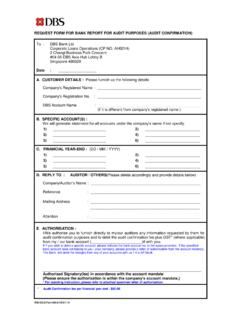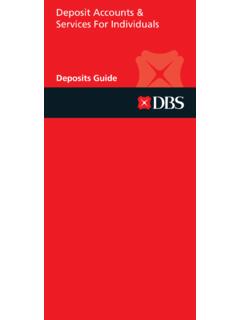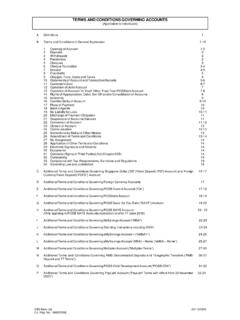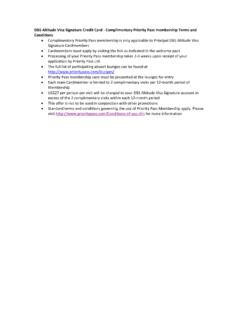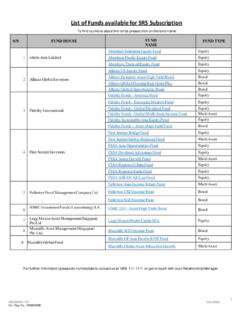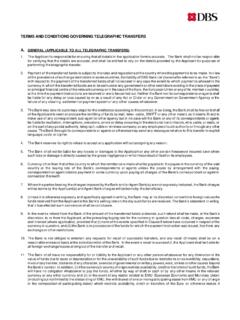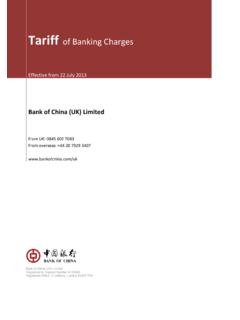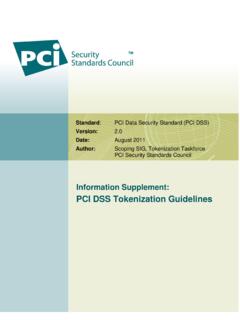Transcription of DBS Multiplier Account
1 DBS Multiplier Account Frequently Asked Questions Return to Content Menu Frequently Asked Questions (FAQs) Content Menu Click on the red section names to jump to your desired section. SECTION A: GENERAL .. 3 SECTION B: PREFERENTIAL INTEREST .. 5 SECTION C: ELIGIBLE TRANSACTIONS .. 7 ( ) INCOME (MANDATORY) .. 9 ( ) CREDIT CARD SPEND .. 11 ( ) HOME LOAN INSTALMENTS .. 12 ( ) INSURANCE .. 13 ( ) INVESTMENTS .. 14 SECTION D: REVISIONS TO Multiplier Account (EFFECTIVE 1 MAY 2020) .. 16 Return to Content Menu SECTION A: GENERAL Q1) What is DBS Multiplier Account ? The DBS Multiplier Account is a deposit Account that rewards you higher interest when you credit your income (salary and/or dividends) and transact in one or more of the following categories: credit card spend, home loan instalment, insurance, investments. It has Singapore Dollar and 12 foreign currencies in one Account . It also comes with iBanking, eStatement but without cheques facilities. Q2) Do I have to move my transactions in my other DBS/POSB accounts to the Multiplier Account ?
2 No. Eligible transactions are automatically detected across the DBS/POSB products held by you. You only need to deposit funds in your Multiplier Account , while transacting with your usual DBS/POSB accounts to enjoy the higher interest rates. Q3) Can I open more than 1 Multiplier Account ? No. You can only open 1 Multiplier Account . Q4) How do I apply for Multiplier Account online? You can apply for Multiplier Account online through iBanking. Login to iBanking and follow one of these options: 1. Setting up a New Multiplier Account by following these steps in iBanking: Apply > Deposit Accounts > DBS Multiplier Account > Instant Apply OR Request > Opt-in Bank & Earn Programme 2. Convert existing personal DBS Autosave or DBS Multi Currency Account (joint Account not allowed) to Multiplier Account in iBanking: Request > More Requests > Request for DBS Autosave Account Conversion 3. Switch Bank & Earn Programme (from POSB Cashback Bonus to Multiplier Account ) in iBanking: Request > More Requests > Switch Bank & Earn Programme Q5) Is the Multiplier Account opened immediately?
3 If you apply for a new Account between Mondays to Sundays (including Public Holidays), 0700 hr to 2230 hr, your Account will be opened instantly. Should the Account be opened on the last day of the month, applications made between 0700 hr and 2000 hr will be opened instantly. Beyond this period, Account opening will take 2 working days (including Public Holidays). Return to Content Menu Q6) What should I take note of before switching from POSB Cashback Bonus to Multiplier Account ? Upon successful switching, any cashback not yet credited will be forfeited. Any existing insurance or invest-saver plan will also cease to be recognised as eligible transactions under Multiplier Account . Q7) I m currently enrolled in POSB Cashback Bonus. Can I open the Multiplier Account as well? No. You can either hold a Multiplier Account or be enrolled in POSB Cashback Bonus at any point in time. Return to Content Menu SECTION B: PREFERENTIAL INTEREST Q1) When will I receive my interest?
4 The interest is credited into your Multiplier Account in 2 parts: Base interest ( ): Credited on the last calendar day of the month Preferential interest (if any): Credited by the 7th working day of the following month Q2) How is the interest calculated? The interest is calculated daily. 1. The preferential interest rate is applied to the end-day S$ balance in your Multiplier Account . 2. Interest earned for each balance tier is calculated and rounded off to the nearest 4 decimal places. 3. Each day s interest earned is summed up and rounded off to the nearest 2 decimal places. 4. The entire month s interest is then summed up. Q3) What do I need to do to enjoy higher interest rates? You need to do the following: 1. Credit your income (salary and/or dividends) to a DBS/POSB deposit Account AND 2. Transact in 1 or more of these 4 categories: Credit Card Spend, Home Loan Instalments, Insurance, Investments These eligible transactions must add up to S$2,000 or more monthly to start enjoying higher interest rates.
5 If you do not qualify, you will still enjoy the prevailing base interest rate ( ) in your Multiplier Account . Please refer to the next page for the examples. Q4) What interest rate will I earn on my Multiplier balances, if I do not fulfil the criteria for preferential interest on balance tiers? Any Multiplier balances that do not fulfil the criteria for preferential interest will earn base interest rates. Return to Content Menu Multiplier Account Balance Total eligible transactions per month First S$25,000 First S$50,000 Next S$50,000 Income + transactions in 1 category Income + transactions in 2 categories Income + transactions in 3 or more categories <S$2,000 ( ) ( ) ( ) S$2,000 to <S$2,500 ( ) ( ) ( ) S$2,500 to <S$5,000 ( ) ( ) ( ) S$5,000 to <S$15,000 ( ) ( ) ( ) S$15,000 to <S$30,000 ( ) ( ) ( ) S$30,000 ( ) ( ) ( ) Example 1: Total eligible transactions for the month: S$7,056, made up of: Income: S$5,000 Credit Card Spend: S$800 Home Loan Instalment: S$1,256 Based on Income + transactions in 2 categories, interest rates for each balance tier will be: First S$50,000: Beyond S$50,000: Example 2: Total eligible transactions for the month: S$31,500, made up of: Income: S$20,000 Credit Card Spend: S$1,000 Home Loan Instalment: S$2,500 Investment.
6 S$8,000 Based on Income + transactions in 3 categories, interest rates for each balance tier will be: First S$50,000: Next S$50,000: Beyond S$100,000: Return to Content Menu SECTION C: ELIGIBLE TRANSACTIONS Q1) Could you provide a quick overview of the eligible transactions? 1. Income (salary and/or dividends) (Mandatory): In any personal or joint DBS/POSB deposit Account . 2. Credit Card Spend: Retail and cash advance transactions with any DBS/POSB personal credit cards. 3. Home Loan Instalments: Monthly instalments due on disbursed DBS/POSB residential loans. 4. Insurance: Monthly premium due on eligible regular premium (RP) policies purchased via DBS/POSB, after you have successfully opened Multiplier Account . Existing RP policies you have before that will not be counted. 5. Investments: (i) DBS Invest-Saver purchased via DBS/POSB after opening your Multiplier Account (existing Invest-Saver purchased before that will not be recognised) (ii) Unit Trust lump-sum purchased via DBS/POSB after opening your Multiplier Account (existing unit trust lump-sum purchased before that will not be recognised); (iii) Online equity trades made via DBS Vickers or DBS Online Equity Trading Q2) Is there a minimum amount required for any category?
7 No. If your total monthly eligible transactions add up to S$2,000 or more, you start enjoying higher interest rates. Total monthly eligible transactions is derived by summing up the monthly amounts within each category: Income (salary and/or dividends), Credit Card Spend, Home Loan Instalments, Insurance and Investments. Q3) Do I have to move my transactions from other DBS/POSB accounts to the Multiplier Account ? No. Eligible transactions are automatically detected across the DBS/POSB products held by you. You only need to deposit funds in your Multiplier Account , while transacting with your usual DBS/POSB accounts to enjoy the higher interest rates. Q4) How do you compute the eligible transactions? Computation begins from the date of Multiplier Account opening to the last day of the month. If your Multiplier Account is opened on the last day of the month, computation will only begin on the first day of the following calendar month. For subsequent months, it will be computed from the first to last day of the month.
8 Q5) How do I keep track of my eligible transactions for the month? You can track your eligible transactions through iBanking: 1. Bank & Earn Summary (View current month and the past 2 months) Return to Content Menu How to navigate to Bank and Earn Summary in iBanking: 2. eStatement How to navigate in iBanking: My Accounts Summary > View eStatement and eAdvice Return to Content Menu ( ) INCOME (SALARY AND/OR DIVIDENDS) (MANDATORY) Q1) How do I qualify for the income category? You can qualify for the income category with either of the following: Salary credit: Credit your salary via GIRO with transaction reference codes SAL or PAY . The main description in your Statement of Account is Salary or GIRO Salary and/or Dividend credit: Dividends credited via GIRO from Central Depository Pte Ltd (CDP) with transaction reference codes CDP or NDIV . For customers with DBS Wealth Management Account , the dividends must be credited from Singapore Exchange (SGX) traded securities.
9 Q2) If I have both eligible salary and dividend credit, does that count as 2 separate categories? No. All are classified under the Income transaction category and so will be counted as 1 category. However, they will all be summed up under total monthly eligible transactions for the month. Salary Credit Q3) What are the eligible salary credit transactions? The salary is credited through GIRO with transaction reference codes SAL or PAY . The main description in your Statement of Account is Salary or GIRO Salary . Example: Q4) My salary credit is not eligible. What should I do? You can inform your company HR to use GIRO code 22 when they process the payroll/salary file to their corporate bank. Q5) My joint Account holder and I credit our salaries into a joint Account and we each have our own Multiplier Accounts. How will the salaries be recognised? The combined total salary credits in that joint Account will be recognised under the individual Multiplier Accounts. Example: John and Mary credit their salaries (S$3000 and S$3100 respectively) into a joint POSB savings Account .
10 They have their own Multiplier accounts too. They are each accorded a total salary credit amount of S$6,100. Return to Content Menu Dividend Credit Q6) What are the eligible dividend credits? Dividends credited from through GIRO from Central Depository Pte Ltd (CDP) with transaction reference codes CDP or NDIV . Dividends from companies listed on Singapore Stock Exchange (SGX), interest payment from Singapore Savings Bond (SSB). For customers with DBS Wealth Management Account , the dividends must be credited from Singapore Exchange (SGX) traded securities. The following transactions will not qualify as Eligible transactions: Dividends from unit trusts, dividends from SRS/CPF investments. Q7) My joint Account holder and I credit our dividends from Central Depository (CDP) into a joint Account . We both have our own Multiplier accounts. How will the dividends be recognised? The combined total dividend credits in that joint Account will be recognised under the individual Multiplier Accounts.
